Coronavirus: Foster denies DUP U-turn on restrictions
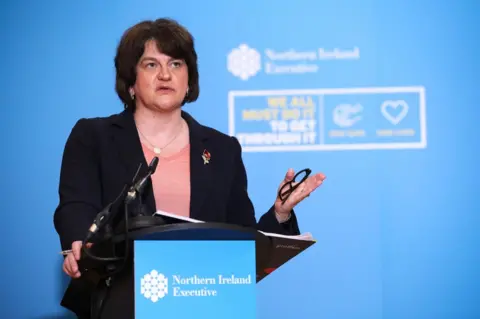 Press Eye
Press EyeFirst Minister Arlene Foster has denied the DUP performed a u-turn by agreeing to tighter Covid-19 restrictions one week after voting against measures proposed to the Stormont Executive.
She said the evidence "had changed" in what was put to ministers at Thursday's executive meeting.
Deputy First Minister Michelle O'Neill said it was the "correct decision".
On Friday, some businesses reopened ahead of a two-week "circuit-break" which will begin on 27 November.
The restrictions have been criticised by many businesses leaders, with the Stormont Executive being described as a "coalition government run by numbskulls" by the prominent hotelier Bill Wolsey.
But Mrs Foster said the executive "had to act" given that the R-number - the average number of people that one infected person will pass the virus to - was close to one.
Ministers were presented with data last week that said the R-number was "around 0.8 and rising".
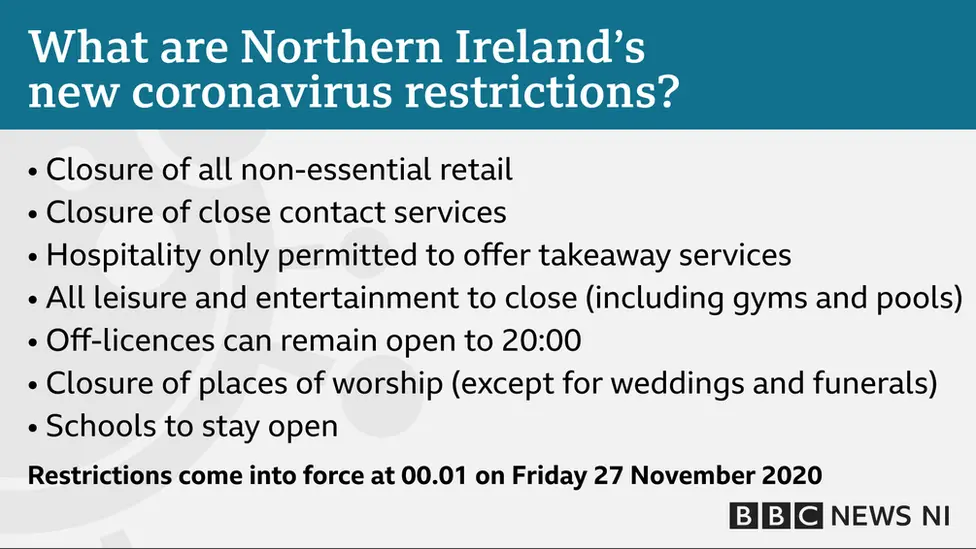
'A big ask for the people of NI'
Health Minister Robin Swann said the latest restrictions were necessary but accepted they were "equivalent of going back to where we were in March and April".
"I understand the frustrations and need for additional support and mechanisms to get businesses through what is going to be a very tough time.
He said the two week circuit breaker was "a big ask" but "necessary so we can return to as normal a Christmas as possible."
"Let's put the differences and arguments behind us and work to get Covid, which is our common enemy, under control," he said.
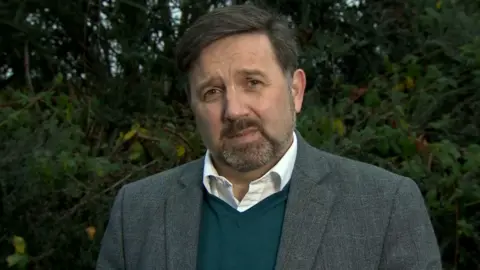
When asked if it was a mistake not to bring these restrictions in earlier, Mr Swann said "Covid does not follow any direction of travel that we as an a executive can put down in a calendar."
He said he could not rule out early school closures before Christmas.
"We're doing all we can to stay open and it is being kept under continued review," he said.
Education Minister Peter Weir said there are no plans for the early closure of schools before the Christmas holidays.
"I believe that schools are the best place for our children for education, mental health and wellbeing and physical development," Mr Weir said.
'Lockdown is correct decision'
Speaking on Friday, the DUP leader said it was a difficult time.
"I'm not pretending these are easy decisions. I regret we had to act but that's what we had to do," she said.
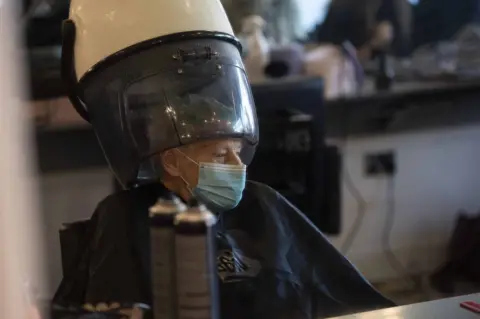 EPA
EPABoth the first and deputy first ministers said the priority now was to ensure businesses affected by the new restrictions received financial support.
Deputy First Minister Michelle O'Neill said she understood the anger felt by businesses that would have to close next week but added that it was was the "correct decision" given the medical and scientific advice ministers had received.
She said she was concerned about what she described as the "contradictory" move to reopen cafes and close-contact businesses on Friday while preparing for a lockdown next week.
The restrictions coming into force from next Friday include the closure of non-essential retail, close-contact services, restaurants, and churches apart from for weddings and funerals.
Ministers have also advised against household gatherings outside of support bubbles, and said people should work from home "if at all possible".
Hotels and other accommodation providers can operate on a restricted basis, such as for work-related travel and for vulnerable people.
'Risk to hospitals was predictable'
On Friday, the Department of Health in Northern Ireland said 12 more people had died after contracting coronavirus and another 369 people had tested positive.
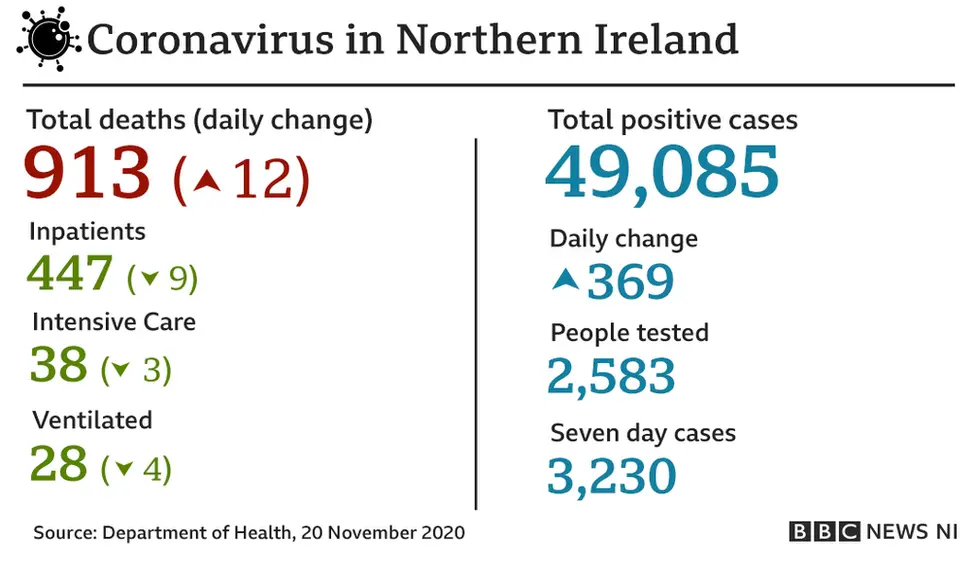
The government statistics agency Nisra said it had recorded a rise in Covid-19-related deaths for the sixth week in a row.
It said 96 deaths were registered in the week up to Friday 13 November, with the overall total standing at 1,201.
The Department of Health in the Republic of Ireland said on Friday that it had been notified of eight more deaths related to Covid-19.
It brings its death toll to 2,018.


Stormont ministers know that last week was very damaging for executive relations.
That penny particularly dropped with the DUP.
DUP ministers, I think, found themselves in a place where they were very fearful that they were on the wrong side of this argument and would be blamed if something went catastrophically wrong.
There was an absolute screeching u-turn, a 180-degree turn.
There is no doubt there was a different atmosphere around the table last night - there was consensus.
But if they are truly united why could they not have come out, even together, and made this point?
Hiding away from questions and scrutiny, as ministers did for hours after the announcement, is not the way to present unity.

Justice Minister Naomi Long said the situation facing ministers was "quite stark" and there was concern that hospitals would be "in a pretty bad state" without tight restrictions being put in place.
Speaking to BBC News NI's Good Morning Ulster on Friday, the Alliance Party leader she said: "It was predictable - we knew this last week."
Health Minister Robin Swann had warned that without immediate action there could be a need for restrictions in December due to the pressures the pandemic is placing on the health service.
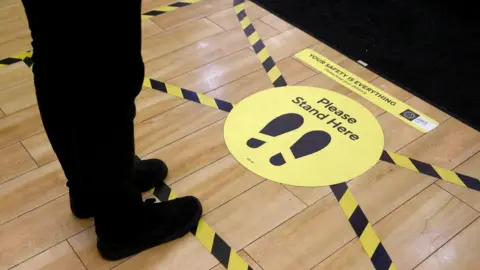 Reuters
ReutersAfter the decision to introduce new measures on Thursday evening, he said: "Without this further intervention there was a very real risk of our hospitals being overwhelmed in the run up to Christmas.
"All of us now have to work really hard to achieve a happier festive season."
It is understood DUP Minister Edwin Poots voiced opposition to the restrictions during the executive meeting.
Stormont sources said the minister, who has previously spoken out against imposing tighter lockdown measures, said it was illogical to close non-essential retail as it could severely damage the high street.
It is believed Mr Poots did not ask for the measures to be put to a vote by the executive and said he would accept whatever measures were agreed by the executive.
Indecision to blame for 'shambles'
Infrastructure Minister Nichola Mallon said advice to the executive was the same on Thursday as it had been weeks ago.
Speaking on BBC Radio Ulster's Talkback, she said the earlier modelling had recommended a six-week lockdown and four-week school closure.
"We should have been taking these decisions long before and not had the shambles of last week, but we have got the right decision now."
She also said she was "not going to pretend that everything is rosy" within the executive, but that all ministers now had a responsibility to support the restrictions.
'No trade, no hope'
Simon Hamilton, the chief executive of the Belfast Chamber, said businesses were "sympathetic" to the need for steps to "save lives".
But he warned that there could be "unfathomable job losses" without "a multi-million pound rescue and support package".
Colin Neill, the chief executive of Hospitality Ulster, said the sector he represents has been "left with no trade, no hope and a huge amount of redundancies".
The executive has said it will develop further financial support packages in the coming days.
On Thursday, it agreed that businesses which are allowed to reopen between 20-26 November but choose not to will be able to access funding.

If you are reading this page on the BBC News app, you will need to visit the mobile version of the BBC website to submit your question on this topic.
